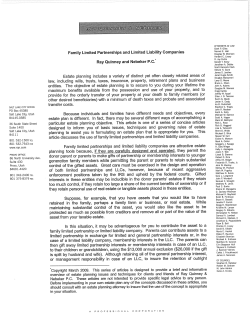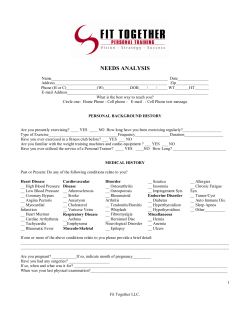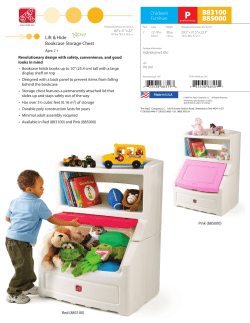
Head First Design Patterns for .NET Companion document to ™ 3.5
Design Pattern Framework™ 3.5 Head First Design Patterns for .NET Companion document to Design Pattern Framework™ 3.5 by Data & Object Factory, LLC www.dofactory.com Copyright © 2008-2009, Data & Object Factory, LLC All rights reserved Page 1 of 22 Design Pattern Framework™ 3.5 Index Index ............................................................................................................................... 2 Chapter 1: Intro to Design Pattern ................................................................................... 4 Page 18: Testing the Duck code .............................................................................. 4 Chapter 2: Observer Pattern ........................................................................................... 5 Page 57: Implementing the Weather Station ............................................................ 5 Page 67: Reworking the Weather Station with built-in support ................................. 5 Page 72: Other places you‟ll find the Observer Pattern ............................................ 5 Chapter 3: Decorator Pattern .......................................................................................... 6 Page 95: Writing the Starbuzz Code ........................................................................ 6 Page 100: Real world Decorators: Java (i.e. .NET) I/O............................................. 6 Chapter 4: Factory Pattern .............................................................................................. 7 Page 112: Identifying the aspects that vary .............................................................. 7 Page 131: It‟s finally time to meet the Factory Method Pattern ................................. 7 Page 145: Families of Ingredients…......................................................................... 7 Chapter 5: Singleton Pattern ........................................................................................... 8 Page 173: Dissecting the classic Singleton Pattern .................................................. 8 Page 175: The Chocolate Factory ............................................................................ 8 Page 180: Dealing with Multithreading ..................................................................... 8 Page 182: Use “double-checked locking” ................................................................. 8 Chapter 6: Command Pattern.......................................................................................... 9 Page 204: Our first command object ........................................................................ 9 Page 210: Implementing the Remote Control ........................................................... 9 Page 216: Undo ....................................................................................................... 9 Page 224: Every remote needs a Party Mode! ......................................................... 9 Chapter 7: Adapter and Facade Patterns ...................................................................... 11 Page 238: If it walks like a duck and quacks like a duck… ..................................... 11 Page 249: Adapting an Enumeration to an Iterator ................................................. 11 Page 255: Home Sweet Home Theater .................................................................. 11 Chapter 8: Template Method Pattern ............................................................................ 12 Page 277: Whipping up some coffee and tea classes (in .NET) ............................. 12 Copyright © 2005-2009, Data & Object Factory, LLC. All rights reserved. Page 2 of 22 Design Pattern Framework™ 3.5 Page 280: Sir, may I abstract your Coffee, Tea? .................................................... 12 Page 300: Sorting with Template Method ............................................................... 12 Page 306: Swinging‟ with Frames .......................................................................... 12 Page 307: Applets .................................................................................................. 13 Chapter 9: Iterator and Composite Pattern .................................................................... 14 Page 317: Menu ..................................................................................................... 14 Page 327: Reworking Menu with Iterator ................................................................ 14 Page 333: Cleaning things up with java.util.Iterator (.NET Iterator)......................... 14 Page 360: Implementing the Menu Component...................................................... 14 Page 369: The Composite Iterator.......................................................................... 15 Chapter 10: State Pattern .............................................................................................. 16 Page 388: State Machines 101 .............................................................................. 16 Page 401: Implementing our State classes ............................................................ 16 Page 413: We still need to finish the Gumball 1 in 10 game .................................. 16 Chapter 11: Proxy Pattern ............................................................................................. 17 Page 431: Coding the Monitor ................................................................................ 17 Page 451: Getting the GumballMachine ready for remote service .......................... 17 Page 462: Get ready for Virtual Proxy .................................................................... 19 Page 474: Using .NET API Proxy to create a protection proxy ............................... 20 Chapter 12: Compound Patterns ................................................................................... 21 Page 501: Duck reunion ......................................................................................... 21 Page 503: When ducks are around, geese can‟t be far .......................................... 21 Page 506: We‟re going to make those Quackologists happy .................................. 21 Page 508: We need a factory to produce ducks! .................................................... 21 Page 513: Let‟s create a flock of ducks .................................................................. 21 Page 516: Can you say „Observer‟? ....................................................................... 22 Page 534: Using MVC to control the beat............................................................... 22 Copyright © 2005-2009, Data & Object Factory, LLC. All rights reserved. Page 3 of 22 Design Pattern Framework™ 3.5 Chapter 1: Intro to Design Pattern The book titled Head First Design Patterns has taken the developer community by storm and has been a bestseller ever since. What has attracted developers is its whimsical and informal approach to explaining advanced OO concepts and design patterns. The book comes with a downloadable set of examples in Java. This is a problem for .NET developers because it is hard to deal with language differences while at the same time learning concepts that initially are not easy to grasp. To alleviate this, the .NET Design Pattern Framework from Data & Object Factory, LLC includes a complete set of Head First Design Pattern code samples in C# and/or VB. It includes 46 projects -- all within in a single .NET Solution for easy access. With the .NET translations we have attempted to stay relatively close to the original Java code. With a smaller gap between the two languages, we felt that a .NET developer would get more out of this book. Finally, just to be clear, to study the .NET code samples you do need a copy of the Head First Design Patterns book available to you. This document does three things: 1) It associates the original Java projects with the .NET projects, 2) It references the .NET projects back to the page where the pattern is discussed, and 3) It highlights noteworthy items that came up during the translation process We are hopeful that you will find the .NET code samples useful in your effort to better understand and apply design patterns in your own work. Chapter 1 includes just one coding example: the Strategy pattern. Page 18: Testing the Duck code Java project name: strategy Implemented as DoFactory.HeadFirst.Strategy Copyright © 2005-2009, Data & Object Factory, LLC. All rights reserved. Page 4 of 22 Design Pattern Framework™ 3.5 Chapter 2: Observer Pattern Page 57: Implementing the Weather Station Java project name: observer/WeatherStation Implemented as DoFactory.HeadFirst.Observer.WeatherStation Page 67: Reworking the Weather Station with built-in support Java project name: observer/WeatherStationObservable Implemented as DoFactory.HeadFirst.Observer.WeatherStationObservable .NET does not support the Observer/Observable built-in types so this example uses two alternative types: the IObserver interface and the Observable base class. However, a better way in .NET would be to use .NET multicast delegates as demonstrated in the next example. Page 72: Other places you‟ll find the Observer Pattern Java project name: observer/Swing Implemented as DoFactory.HeadFirst.Observer.DotNet .NET does not support Swing, therefore, this example runs as a console application. In .NET the Observer Pattern is implemented with multicast delegates, which is demonstrated in this example. Copyright © 2005-2009, Data & Object Factory, LLC. All rights reserved. Page 5 of 22 Design Pattern Framework™ 3.5 Chapter 3: Decorator Pattern Page 95: Writing the Starbuzz Code Java project name: decorator/starbuzz Implemented as DoFactory.HeadFirst.Decorator.Starbuzz Page 100: Real world Decorators: Java (i.e. .NET) I/O Java project name: decorator/io Implemented as DoFactory.HeadFirst.Decorator.IO The IO namespace in .NET uses the Decorator pattern quite extensively. This example demonstrates the use of a CryptoStream that decorates a FileStream. The CryptoStream links data streams to cryptographic transformations (encryption and decryption services). To run this example you need a text file „MyInFile.txt‟ with some text in the project directory – you could use “I know the decorator pattern therefore I rule!” as demonstrated in the Head First Design Patterns book. Two new files are created in the same directory; one the same as the input file, the other the same but encrypted (using the decorator pattern). Copyright © 2005-2009, Data & Object Factory, LLC. All rights reserved. Page 6 of 22 Design Pattern Framework™ 3.5 Chapter 4: Factory Pattern Page 112: Identifying the aspects that vary Java project name: factory/pizzas Implemented as DoFactory.HeadFirst.Factory.PizzaShop Page 131: It‟s finally time to meet the Factory Method Pattern Java project name: factory/pizzafm Implemented as DoFactory.HeadFirst.Factory.Method.Pizza Note: page 137 details the DependentPizzaStore which also exists in this project. Page 145: Families of Ingredients… Java project name: factory/pizzaaf Implemented as DoFactory.HeadFirst.Factory.Abstract.Pizza Copyright © 2005-2009, Data & Object Factory, LLC. All rights reserved. Page 7 of 22 Design Pattern Framework™ 3.5 Chapter 5: Singleton Pattern Page 173: Dissecting the classic Singleton Pattern Java project name: singleton/classic Implemented as DoFactory.HeadFirst.Singleton.Classic Page 175: The Chocolate Factory Java project name: singleton/chocolate Implemented as DoFactory.HeadFirst.Singleton.Chocolate Page 180: Dealing with Multithreading Java project name: singleton/threadsafe Implemented as DoFactory.HeadFirst.Singleton.Multithreading This project includes an EagerSingleton which „eagerly creates the instance‟. This occurs when the class is loaded for the first time. Furthermore, this is a thread-safe .NET solution to the multithreading issues discussed in this example. Page 182: Use “double-checked locking” Java project name: singleton/dcl Implemented as DoFactory.HeadFirst.Singleton.DoubleChecked Copyright © 2005-2009, Data & Object Factory, LLC. All rights reserved. Page 8 of 22 Design Pattern Framework™ 3.5 Chapter 6: Command Pattern Page 204: Our first command object Java project name: command/simpleremote Implemented as DoFactory.HeadFirst.Command.SimpleRemote Page 210: Implementing the Remote Control Java project name: command/remote Implemented as DoFactory.HeadFirst.Command. Remote Page 216: Undo Java project name: command/undo Implemented as DoFactory.HeadFirst.Command.Undo A .NET enumeration named CeilingFanSpeed was added to replace the HIGH, LOW, MEDIUM, and OFF constants in Java. Page 224: Every remote needs a Party Mode! Java project name: command/party Copyright © 2005-2009, Data & Object Factory, LLC. All rights reserved. Page 9 of 22 Design Pattern Framework™ 3.5 Implemented as DoFactory.HeadFirst.Command.Party A .NET enumeration named CeilingFanSpeed was added to replace the HIGH, LOW, MEDIUM, and OFF constants in Java. Copyright © 2005-2009, Data & Object Factory, LLC. All rights reserved. Page 10 of 22 Design Pattern Framework™ 3.5 Chapter 7: Adapter and Facade Patterns Page 238: If it walks like a duck and quacks like a duck… Java project name: adapter/ducks Implemented as DoFactory.HeadFirst.Adapter.Duck Page 249: Adapting an Enumeration to an Iterator Java project name: adapter/iterenum Implemented as DoFactory.HeadFirst.Adapter.IterEnum Unlike Java, .NET does not have legacy Enumeration interfaces. This example builds on .NET‟s built-in facility to iterate over different types of collections. Page 255: Home Sweet Home Theater Java project name: facade/hometheater Implemented as DoFactory.HeadFirst.Facade.HomeTheater Copyright © 2005-2009, Data & Object Factory, LLC. All rights reserved. Page 11 of 22 Design Pattern Framework™ 3.5 Chapter 8: Template Method Pattern Page 277: Whipping up some coffee and tea classes (in .NET) Java project name: template/simplebarista Implemented as DoFactory.HeadFirst.Template.SimpleBarista Page 280: Sir, may I abstract your Coffee, Tea? Java project name: template/barista Implemented as DoFactory.HeadFirst.Template. Barista This example also includes code for page 292: Hooked on Template Method… Page 300: Sorting with Template Method Java project name: template/sort Implemented as DoFactory.HeadFirst.Template.Sort Uses the .NET built-in IComparable interface Page 306: Swinging‟ with Frames Java project name: template/frame Implemented as DoFactory.HeadFirst.Template.WindowsService Copyright © 2005-2009, Data & Object Factory, LLC. All rights reserved. Page 12 of 22 Design Pattern Framework™ 3.5 Swing and Jframe do not exist in .NET. A good example of where .NET Template methods are used is when you write a Windows Services app which requires that you implement several „hooks‟ (or Template methods), such as OnStart() and OnStop(). The Visual Studio.NET generated boilerplate code requires that you simply implement the body of these methods. Note: this is a Windows Service and therefore does not run as a standalone executable. Page 307: Applets Java project name: template/applet Implemented as DoFactory.HeadFirst.Template.Control Applets are similar to controls in .NET. This example shows that a Windows event handlers are simply „hooks‟ that you can choose to implement or not. Typically, you will implement very few of the templated events that you can respond to. Copyright © 2005-2009, Data & Object Factory, LLC. All rights reserved. Page 13 of 22 Design Pattern Framework™ 3.5 Chapter 9: Iterator and Composite Pattern Page 317: Menu Java project name: iterator/dinermerger Implemented as DoFactory.HeadFirst.Iterator.DinerMerger Page 327: Reworking Menu with Iterator Java project name: iterator/dinermergeri Implemented as DoFactory.HeadFirst..Iterator.DinerMergerI Page 333: Cleaning things up with java.util.Iterator (.NET Iterator) Java project name: iterator/dinermergercafe Implemented as DoFactory.HeadFirst.Iterator.DinerMergerCafe In following the book, this example uses the built-in.NET IEnumerator interface. However, iterating over collections is far easier with the .NET foreach statement. On page 349 the book talks about iterators and collections in Java 5. It is interesting to note that the new Java 5 for statement is similar to C#‟s foreach statement. Page 360: Implementing the Menu Component Java project name: composite/menu Copyright © 2005-2009, Data & Object Factory, LLC. All rights reserved. Page 14 of 22 Design Pattern Framework™ 3.5 Implemented as DoFactory.HeadFirst.Composite.Menu Page 369: The Composite Iterator Java project name: composite/menuiterator Implemented as DoFactory.HeadFirst.Composite.MenuIterator The .NET implementation was simplified because the iterator with the Stack example in Java is overly complex. The Java code includes dubious try/catch usage and adds little value to learning Design Patterns principles. Copyright © 2005-2009, Data & Object Factory, LLC. All rights reserved. Page 15 of 22 Design Pattern Framework™ 3.5 Chapter 10: State Pattern Page 388: State Machines 101 Java project name: state/gumball Implemented as DoFactory.HeadFirst.State.Gumball An enumeration GumballMachineState replaces the Java contants SOLD_OUT, NO_QUARTER, HAS_QUARTER, and SOLD. Page 401: Implementing our State classes Java project name: state/gumballstate Implemented as DoFactory.HeadFirst.State.GumballState Page 413: We still need to finish the Gumball 1 in 10 game Java project name: state/gumballstatewinner Implemented as DoFactory.HeadFirst.State.GumballStateWinner Copyright © 2005-2009, Data & Object Factory, LLC. All rights reserved. Page 16 of 22 Design Pattern Framework™ 3.5 Chapter 11: Proxy Pattern Page 431: Coding the Monitor Java project name: proxy/gumballmonitor Implemented as DoFactory.HeadFirst.Proxy.GumballMonitor Page 451: Getting the GumballMachine ready for remote service Java project name: proxy/gumball Implemented as: DoFactory.HeadFirst.Proxy.GumballState.Client (a console application exe) DoFactory.HeadFirst.Proxy.GumballState.Host (a WCF Web Service) DoFactory.HeadFirst.Proxy.GumballState.Machine (a class library) RMI only exists in the Java world. The new .NET 3.5 Communication Subsystem is WCF. In this example we demonstrate the use of a .NET Proxy object which is used to invoke a remote class. Three projects are required for this demonstration. Compile the above projects and set the Client as the Startup Project in Visual Studio. When running the Client you will see the ASP.NET Web Server starting up (see image on next page). Copyright © 2005-2009, Data & Object Factory, LLC. All rights reserved. Page 17 of 22 Design Pattern Framework™ 3.5 The client GumballMachineClient is a proxy object that „stands in‟ for a remote object. This proxy object will communicate with a remote instance of the GumballMachine that is exposed by the Host project. The results of the interaction are printed on the console screen. Note: if you have an Internet security program and you are running the GumBallMachineClient for the first time you may see this dialog box. Simply select OK. Copyright © 2005-2009, Data & Object Factory, LLC. All rights reserved. Page 18 of 22 Design Pattern Framework™ 3.5 Page 462: Get ready for Virtual Proxy Java project name: proxy/virtualproxy Implemented as DoFactory.HeadFirst.Proxy.VirtualProxy This simple .NET Windows Application uses an ImageProxy object. ImageProxy retrieves a book cover image from amazon.com on a separate thread. In the meantime (while retrieving) it provides a placeholder image that is stored locally. Click twice on the button to see Virtual Proxy in action. Note: you do need Internet access to make this work. In addition, if you have an Internet Security program running you may see the following dialog box when running for the first time. Simply select the recommended action. Copyright © 2005-2009, Data & Object Factory, LLC. All rights reserved. Page 19 of 22 Design Pattern Framework™ 3.5 Page 474: Using .NET API Proxy to create a protection proxy Java project name: proxy/javaproxy Implemented as DoFactory.HeadFirst.Proxy.DotNetProxy A dynamic proxy dynamically generates a class that conforms to a particular interface, proxying all invocations to a single 'generic' method. This functionality is standard in Java but not in .NET. In .NET there are two ways to implement this: one is to use the built-in RealProxy class and another way is to use Reflection.Emit. Prior versions of the Design Pattern Framework included the dynamic proxy pattern using the Reflection.Emit method. It was based on the Open Source Nmock project (nmock.org). However, the internal details of NMock are beyond the scope of our pattern discussions and there was little or no educational value to the Pattern student. Therefore, with version 3.5 of the Design Pattern Framework we have removed this project from the Head First Design Pattern solution. Copyright © 2005-2009, Data & Object Factory, LLC. All rights reserved. Page 20 of 22 Design Pattern Framework™ 3.5 Chapter 12: Compound Patterns Page 501: Duck reunion Java project name: combining/ducks Implemented as DoFactory.HeadFirst.Combining.Ducks Page 503: When ducks are around, geese can‟t be far Java project name: combining/adapter Implemented as DoFactory.HeadFirst.Combining.Adapter Page 506: We‟re going to make those Quackologists happy Java project name: combining/decorator Implemented as DoFactory.HeadFirst.Combining.Decorator Page 508: We need a factory to produce ducks! Java project name: combining/factory Implemented as DoFactory.HeadFirst.Combining.Factory Page 513: Let‟s create a flock of ducks Java project name: combining/composite Copyright © 2005-2009, Data & Object Factory, LLC. All rights reserved. Page 21 of 22 Design Pattern Framework™ 3.5 Implemented as DoFactory.HeadFirst.Combining.Composite Page 516: Can you say „Observer‟? Java project name: combining/observer Implemented as DoFactory.HeadFirst.Combining.Observer Page 534: Using MVC to control the beat Java project name: combined/djview Implemented as DoFactory.HeadFirst.Combined.MVC As mentioned before, there is nothing similar to Java Swing in .NET. Therefore, this example is built as a standalone WinForms application. A timer control is used to generate the beat (with Beep). The image on page 530 most closely resembles the implementation in this .NET example. The only exception is line 5 (“I need your state information”); there is no need for the View to query the Model because the state (the BeatsPerMinute) is sent as part of line 4 (“I have changed”) using event arguments. Copyright © 2005-2009, Data & Object Factory, LLC. All rights reserved. Page 22 of 22
© Copyright 2025


















